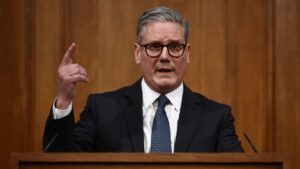Winter fuel payment changes – are you still eligible?
This year about 1.5 million pensioners will be eligible for the winter fuel payment – down from 11.4 million when the payment was universal. Here is what you need to know about the changes.

The winter fuel payment has been scrapped for millions of pensioners.
The government announced the change at the end of July, along with a raft of other cuts to fill a £22bn “black hole” in public finances.
MPs have now voted to allow the controversial plan to go ahead, which Chancellor Rachel Reeves says will save about £1.5bn each year.
The payment is aimed at helping pensioners pay for higher fuel bills during the colder months, but now only the country’s poorest pensioners will get financial aid.
Wondering if you’re still eligible for the payment?
Here is what you need to know:
Who is now eligible for the winter fuel payment?
The winter fuel payment will now be limited to people over state pension age who are receiving pension credit or a limited number of other benefits.
These benefits are: Income support; income-based jobseeker’s allowance; income-related employment and support allowance; universal credit.
The changes mean about 1.5 million people will be eligible – down from 11.4 million when the payment was available to anyone over the age of 66.
How much is the payment?
The payment is £200 for households receiving pension credit where the recipients are all under 80.
If someone in the household is over the age of 80, the payment is increased to £300.
What were the rules before?
Previously, the payments were available to everyone above state pension age.
Last year, the base rate of £200 was paid to everyone born before 25 September 1957, while those born before 25 September 1943 received £300.
This was boosted by a £300 per household pensioner cost of living payment.
How is the payment made?
Most people get the winter fuel payment automatically, and those eligible should receive a letter in the autumn saying how much they will get.
Read more from Sky News:
How would an outdoor smoking ban work?
How could the government change council tax?
Voter ID rules ‘discouraged’ some people from voting in general election

Keep up with all the latest news from the UK and around the world by following Sky News
Who is eligible for pension credit?
Pension credit is available to pensioners whose income falls below a certain threshold – the payment tops up their income to this amount.
For people with a partner, income is calculated together.
Income includes state and private pensions, earnings, and social security benefits including a carer’s allowance.
But not everything counts as income – disability payments, housing benefit, and council tax reduction are among the benefits that aren’t counted.
Pension credit tops up your weekly income to £218.15 if you’re single and £332.95 if you have a partner.
Pension credit is often described as a “gateway benefit” as it can lead to further support, including help with housing costs, council tax and heating bills.
Previous estimates published by the government indicated up to 850,000 households who were entitled to receive pension credit in 2019-20 did not claim the benefit.
The benefit can be claimed by phone and online, and an online calculator can help pensioners check if they are likely to be eligible and get an estimate of what they may receive.
👉 Click to subscribe to the Sky News Daily wherever you get your podcasts 👈
Controversial change gets the go-ahead
On Tuesday 10 September MPs voted on a motion to cancel the government’s cut to the winter fuel allowance.
348 MPs voted to approve the winter payment cut and 228 voted to cancel it, meaning it has now gone through.
It came after a lengthy debate in the Commons opened by Mel Stride, the shadow work and pensions secretary, who said nine out of 10 pensioners will lose the benefit “at the most difficult time of year… when the energy price cap is going up by 10%”.
“What happened to transparency? What happened to integrity? It went out of the window,” Mr Stride said.
Labour MP Rachel Maskell – who has been outspoken in her opposition to the plan – told the Commons of pensioners “frightened” to turn on the lights in case they cannot pay their bills.
“It’s with my conscience that I cannot vote for these measures,” she said.
Labour’s Debbie Abrahams was also critical of the move, saying many of the government’s measures to ease costs on households would not be in place for this winter.
Earlier, Prime Minister Sir Keir Starmer faced down critics as he told union members gathered at the TUC conference in Brighton that he “owes working people the respect of economic stability” and makes “no apologies for any of the decisions we’ve had to take to begin the work of change”.
What has the chancellor said about the change?
Chancellor Rachel Reeves said the decision to scrap winter fuel payments for some pensioners was a “difficult” one she did not want to make.
“This level of overspend is not sustainable,” she said.
“Left unchecked, it is a risk to economic stability and, unlike the party opposite, I will never take risks with our country’s economic stability.”
Ms Reeves said while the government would continue to protect the pension triple lock – the measure to raise state pensions every year by the level of average earnings, inflation or 2.5% – the winter fuel payment would no longer be universal.
“Let me be clear, this is not a decision I wanted to make, nor is it the one I expected to make – but these are the necessary and urgent decisions that I must make,” she said.
What has the response been?
Martin Lewis, founder of MoneySavingExpert, warned the targeting of the payments was “too narrow with the winter we have coming”, adding: “The energy price cap is likely to rise 10% this October and stay high across the winter, leaving most energy bills nearly double those pre-crisis, at levels unaffordable for millions.
“Many pensioners eke out the £100 to £300 winter fuel payments to allow them to keep some heating on through the cold months.
“While there’s an argument for ending its universality due to tight national finances, it’s being squeezed to too narrow a group – just those on benefits and pension credit. Yet again, those just above the thresholds will be hardest hit.”
Be the first to get Breaking News
Install the Sky News app for free


Caroline Abrahams from Age UK said the charity strongly opposes the means-testing of the winter fuel payment.
“A big reason for this disastrous outcome is that more than one in three pensioners entitled to pension credit, the qualifying benefit for [winter fuel payment] under this proposal, don’t receive it, a proportion that’s been roughly constant for many years.
“It is well established that pensioners tend to do everything possible to avoid going into debt, so if they are worried about their future energy bills, we know their likely response will be to ration their fuel use and economise by reducing their spending on other essentials.
“This proposed policy change is therefore certain to result in more older people experiencing a horrible eating or heating dilemma.”


